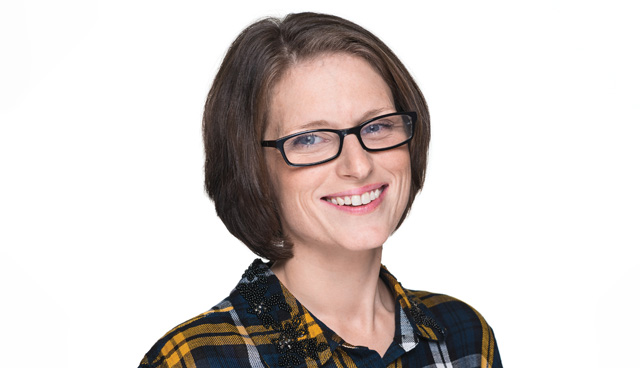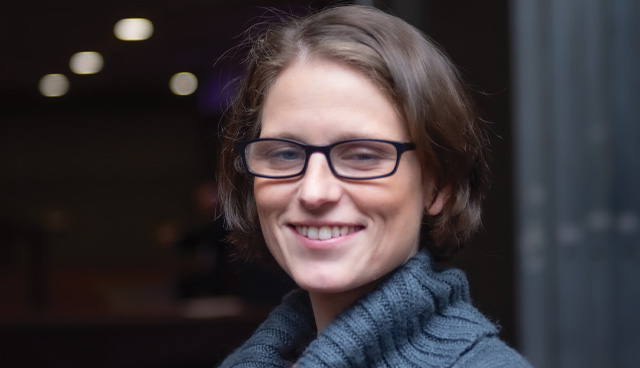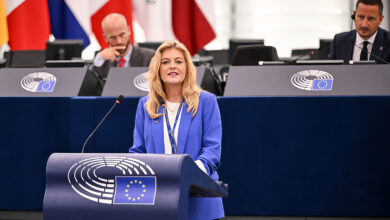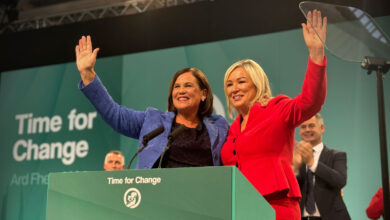
First elected to the Dáil in February 2020, Violet-Anne Wynne is Sinn Féin’s TD for the Clare constituency. A graduate of Trinity College Dublin, Wynne previously worked as a home help provider for young adults with disabilities and is a former member of the Reserve Defence Forces, having accumulated three years of infantry experience. The Offaly native relocated to Clare before joining Sinn Féin in 2012 and unsuccessfully stood in the 2019 local elections.
How did your political career begin?
My political career began in 2012, after only one year of living in rural Clare with my young family and my partner whom at the time was diagnosed with a rare neurological disorder. I discovered very quickly how truly difficult life is in the countryside due to lack of access to transport, medical treatment, and everyday opportunities such as shopping and how this can significantly affect your financial situation and your overall wellbeing. My thirdborn child was experiencing great difficulties also and needed medical intervention as he was not getting enough oxygen due to enlarged adenoids. He was later diagnosed with Autism and the difficulties he and my family faced during these times angered me so much that I wanted to take action and I joined Sinn Féin. I was particularly angry that austerity measures affected the most disadvantaged or marginalised. Services were cut where they really should not have been – it was not corporations targeted – it was the elderly, it was children, and it was disabled people. That put a fire in my belly and made me take action.
What are your most notable achievements to date?
I was appointed as a Sinn Féin representative on the Joint Oireachtas Committee for Disability Matters tasked with Monitoring the implementation of the UNCRPD. I co-signed two bills; the first being a River Agency Management bill and the second was legislation to ban accent-based discrimination and/or discrimination based on socio-economic background or address. I am also the third female ever elected as a TD in Clare and the first Sinn Féin TD in nearly 100 years.
What is unique about representing the Clare constituency?
What is unique about representing Clare is its huge geographical area and the number of constituents living rurally with a distinct lack of access to the basics, including: adequate housing; health and mental health services; public transport; and job opportunities. The lack of balanced regional development over the years from successive governments that have failed to invest in these rural towns and villages that are in desperate need of investment, including wastewater treatment services, for example, is what inspired me to get into politics. These services should have been planned for long before now and many constituents suffer lack of supply or substandard supply of running water. Imagine not even having consistent supply to clean water in an extremely developed, affluent nation such as ours. Something is very wrong with that system. What is unique to Clare I suppose is that it boasts some of the island’s most impressive and stunning landscapes and tourist sites, including Bunratty Castle and Folk Park, the Cliffs of Moher and the Burren, yet it still is not resourced and funded in the way it should be the provide the basics to its population.

“This pandemic has been a very polarising time, but Sinn Féin stands and fights for unity instead of separation. That is what Ireland needs right now.”
What are your priorities going forward?
My priorities going forward are housing, and equal access to social and affordable housing. It really disturbs me that in this society housing is seen as a luxury item that only the few can afford, while the many are put through the ringers of inflation and an unstable rental market. The fact that there is a generation of people to which the prospect of owning their own home seems unlikely is enough to tell us that something is very broken in this system. Equal access for all will mean readily available provision of adaptations required by our constituents that have disabilities. My priority is to bring their voices to the Disability Matters committee, and into representations to the Housing Minister and the local authorities. There is a need for interdepartmental coordination and this needs to be made a reality. I will also be prioritising the ratification of the optional protocol as this is an indictment that Ireland still has not ensure that this has been done to date. Waiting until our first reporting cycle is complete is a huge delaying tactic and a distraction from the work that needs to be planned for.
How can the Sinn Féin maximise its impact in the lifetime of the 33rd Dáil?
We can maximise our impact by ensuring that we lead by example and ensure a coordinated approach throughout our team to be across all the pressing issues that Covid-19 has highlighted and brought to the fore. Likewise, we must sustain the work that we do, such as engaging with the stakeholders involved and acting as a platform for those local representations to be heard. We can continue to work with the people and for the people, and together help to create a more just, strong, and equal society for the people of this island. This pandemic has been a very polarising time, but Sinn Féin stands and fights for unity instead of separation. That is what Ireland needs right now.
What are your interests outside of the political sphere?
My interests outside of the political sphere are my children and ensuring that they are happy and healthy as we navigate a society where services are cut or curtailed and much needed departments are suffering same. I love my family and am a very family-centred person. Every family deserves a safe, happy life – not one spent battling for services. Having studied psychology, I also have great interest in mental health, and the fact that the Government, and many governments before this one have not seemed to transform mental health services, even though there are people crying out for help is beyond me. The personal is political to me!





